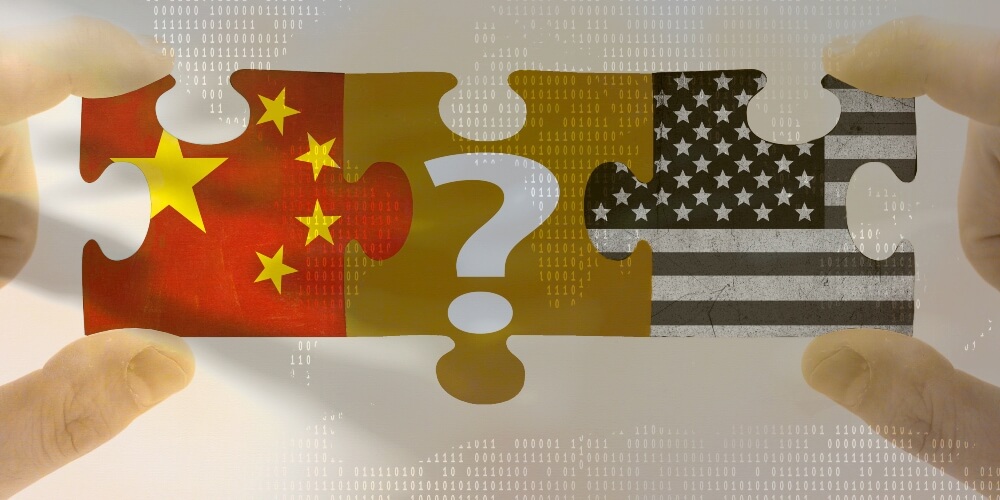
As the US and China vie for global influence, AI will be central to the balance of power
Something stood out of the ordinary during a speech by China’s president, Xi Jinping, in January 2018. Behind Xi, on a bookshelf, were two books on artificial intelligence (AI). Why were those books there? Similar to 2015, when Russia “accidentally” aired designs for a new weapon, the placement of the books may not have been an accident. Was China sending a message?
If it was, perhaps, it was this: For decades, China has been operating in an Americanized-world. To escape, China is turning to AI.
IMPLICATIONS OF CHINA’S AI
By 2030, China wants to be the world’s leading AI power, with an AI industry valued at $150 billion. How does China plan to achieve this?
Take health care. Ping An, a large Chinese conglomerate, has unveiled AI doctors. It has launched clinics known as “One-Minute Clinic,” where AI doctors diagnose symptoms and propose medications. Within three years, Ping An plans to build hundreds of thousands of these clinics across China.
Could China export 10,000 AI doctors to Russia? Such a move would transform geopolitics.
The biggest impact is that it would shift the China-Russia relationship, from energy and currency, areas that the U.S. can influence, to Chinese AI, over which the U.S. has no control. The AI doctors may make Russian society more China-centric, and future generations in Russia may be more familiar with Ping An than with IBM or Intel.
There are other geopolitical implications too.
First, labor movements, which have long been a variable of geopolitics (e.g., H1B tensions between the U.S. and India, or treatment of Filipino maids in Middle East), would now revolve around the movements (and restrictions) of Chinese AI.
Second, China may, for the first time, create an ecosystem that the rest of the world depends on. The AI doctors may need to be programmed with local Russian regulations or health care rules, and Russian start-ups could emerge to fill this gap, or even to expand the role these AI doctors play. These Russian companies will be depending on a Chinese ecosystem, the same way U.S. companies like Uber and Lyft depend on American ecosystems like app stores.
Lastly, the huge amounts of data that the AI doctors will be collecting could be used by China to help its businesses. Chinese pharmaceutical companies, for example, could know about a virus that is emerging in St. Petersburg, and they could quickly manufacture drugs to treat this virus. China would have insight into Russia in a way no other country has ever had, including the U.S.
HOW THE U.S. CAN STRIKE BACK
The U.S. should not try to stop China from taking its AI around the world. It’s too late for that. Instead, the U.S. should focus on controlling how Chinese AI behaves.
To do this, the U.S. should create the world’s first “AI Trade Organization” or AITO. Just like in the 20th century, when the U.S. created the World Trade Organization (WTO) to govern traditional trade, AITO would govern AI trade.
AITO would establish the international rules, ethics and standards for AI.
Of course, China, and others, may refuse to join AITO, for obvious reasons. But, those nations are not the target. The target is countries that China could take its AI to in the future.
For example, China may decide to take its AI to India. Already, India is largely dependent on Chinese smartphones. China could leverage this and bring Chinese AI assistants to these smartphones. Now, hundreds of millions of people in India will be dependent on Chinese AI. And China may want these assistants to benefit Chinese businesses. If someone in India asks the AI to find a rug online or find a new bank to store cryptocurrency, the AI may promote Chinese companies over Indian or American.
Except, India may be a member of AITO. And, AITO may have created a rule that requires members to install code in all AI services operating in the country, to make the AI behave fairly and to remove any bias.
In that case, China’s AI may not be able to give Chinese businesses an edge in India.
As more nations join AITO, more and more governments may ask Chinese companies to hand over the source code of their AI before they can sell. Slowly, rules created in Washington may restrict and control how Chinese AI behaves around the world.
FACING OBSTACLES
For both China and the U.S., there are big obstacles.
For China, the biggest obstacle is trust. For example, in June, 2018, the Solomon Islands, in the Pacific Ocean, rejected a bid by Huawei to build an underwater communications cable. It did this after Australia protested, and offered to fund and build the cable itself. Like many countries, Australia is wary of Chinese technology and access to data.
Will China face similar setbacks as governments worry that the Chinese AI is spying on citizens or sending sensitive data back to China? If a Chinese firm approaches Luxembourg or Belgium and offers AI teachers, it might scare the United Kingdom, Germany or France, and push them to come up with their own alternative.
For the U.S., the biggest obstacle is data laws that benefit Chinese AI firms. For example, in January 2018, Alibaba signed a deal to supply Kuala Lumpur with “City Brain,” an AI system that makes cities smart.
Because of data concerns that Malaysia may have, Chinese businesses may already be at work, lobbying policy makers to craft laws in a way that benefit China more than anyone else.
Could Malaysia introduce a rule that requires all AI services in Malaysian cities to route their data through City Brain? This would mean that if Amazon is supplying Kuala Lumpur with its facial recognition technology, all of the data would be “handed” to China. Will Amazon, and the U.S., be comfortable with this? Will Amazon have a choice, considering not complying could mean losing market access?
As nations compete around AI, they are part of the biggest battle for global power since World War II. Except, this battle is not about land or resources. It is about data, defense and economy. And, ultimately, how these variables give a nation more control over the world.
This is not a cold war. It is an algorithmic war.
Except this battle is not just between the U.S. and China. There are also countries like India, Russia, Israel and Japan, each of whom have their own ambition and vision.
The U.S. and China. though, stand to lose and gain the most. For the U.S., AI could lead to a de-Americanized world. For China, AI could truly ring in the Chinese century. Perhaps Russian President Vladmir Putin’s words are more important than ever before, when he warned that the country that controls AI will control the world.
The question is however, was this just a casual statement, or as with the AI books present during the Chinese president's speech, was Russia’s president sending a message?

